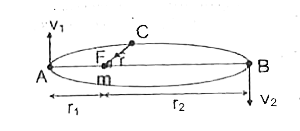A comet orbits the Sun in a highly elliptical orbit. Does the comet have a constant (a) linear speed (b) angular speed (c) angular momentum (d) kinetic energy (e) potential energy (f) total energy throughout its orbit? Neglect any mass loss of the comet when it comes very close to the Sun.
(a) No, the comet has does not have a constant linear speed because a planet moves faster when it is close to the sun and moves slower when it is away from the sun.
(b) No, the comet does not have a constant angular speed.
(c ) Yes, the angular momentum is conserved.
(d) No, the linear speed of a planet is varying, therefore, kinetic energy of the comet is also changing.
(e) No, as the distance of the comet from the SUn is changing the comet does not have a constant potential energy.
(f) Yes, the comet has a constant total energy throughout its orbit.
Topper's Solved these Questions
- BOOK - MODERN PUBLICATIONCHAPTER - GRAVITATIONEXERCISE - NCERT FILE (Additional Exercises)4videos
GRAVITATION
- BOOK - MODERN PUBLICATIONCHAPTER - GRAVITATIONEXERCISE - NCERT FILE (Exemplar Problems (Objective Questions) (Multiple Choice questions) )33videos
GRAVITATION
- BOOK - MODERN PUBLICATIONCHAPTER - GRAVITATIONEXERCISE - Tough & Tricky Problems10videos
GRAVITATION
- BOOK - MODERN PUBLICATIONCHAPTER - MATHEMATICAL TOOLSEXERCISE - PRACTICE PROBLEMS (10)12videos
MATHEMATICAL TOOLS
Similar Questions
A comet orbits the Sun in a highly elliptical orbit. Does the comet have a constant (a) linear speed (b) angular speed (c) angular momentum (d) kinetic energy (e) potential energy (f) total energy throughout its orbit? Neglect any mass loss of the comet when it comes very close to the Sun.
View SolutionA planet is revolving around the sun in an elliptical orbit. Which out of the following remains constant.
(a) Linear speed (b) angular momentum
( c) kinetic energy (d) potential energy (e) total energy throughout its orbit.View Solution
Knowledge Check
- Question 1 - Select One
A comet is revolving around the sun in an elliptical orbit. Which of the following will remain constant throughout its orbit?
AKinetic energyBPotential enegyCLinear speedDAngular momentum - Question 2 - Select One
A planet is moving in an elliptic orbit. If T,V,E and L stand, respectively, for its kinetic energy, gravitational potential energy, total energy and angular momentum about the centre of force, then
AT is conservedBV is always positiveCE is always negativeDmagnitude of L is conserved but its direction changes continuously - Question 3 - Select One
A comet revolves around the sun in an eliptical orbit. When it is closest to the sun at a distance d, its corresponding kinetic energy is k0. If it is farthest from the sun at distance 3d then the corresponding kinetic energy will be
Ak09B8k09Ck04D4k09
In the figure shown a planet moves in an elliptical orbit around the sun. Compare the speeds, linear and angular momenta at the points A and B.
 View Solution
View SolutionA star like the sun has serveral bodies moving around it at different distance. Consider that all of them are moving in circular orbits. Let r be the distance of the body from the centre of the star and let its linear velocity be υ, angular velocity ω, kinetic energy K, gravitational potential energy U, total energy E and angular momentum L. As the radius r of the orbit increase, determine which of the above quantities increase and which ones decrease.
View SolutionA rod of mass m spins with an angular speed ω=√gl, Find its a. kinetic energy of rotation. b. kinetic energy of translation c. total kinetic energy.
 View Solution
View SolutionFor a planet moving and the sun in an elliptical orbit, which of the following quantities remain constant?
(i) The total energy of the 'sun plus planet' system
(ii) The angular momentum of the planet about the sun
(iii) The force of attraction between the two
(iv) The linear momentum of the planetView SolutionA comet of mass m moves in a highly elliptical orbit around the sun of mass M the maximum and minium distacne of the comet from the centre of the sun are r1 and r2 respectively the magnitude of angular momentum of the comet with respect to the centre of sun is
View Solution

